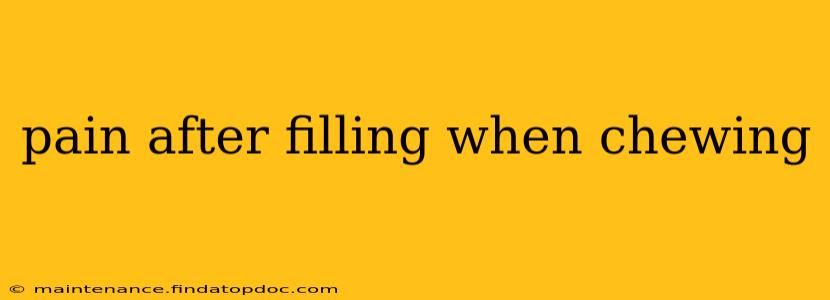Experiencing pain after a dental filling when chewing is a common concern, often causing discomfort and impacting daily life. This post will explore the potential causes of this pain, effective treatment options, and preventive measures to avoid future issues. We'll also address frequently asked questions surrounding post-filling dental pain.
What Causes Pain After a Filling When Chewing?
Several factors can contribute to post-filling pain when chewing. The most common culprits include:
-
High Filling: If the filling is placed too high, it can interfere with your bite, causing pain and discomfort when chewing. This is often the most straightforward cause and easily addressed by your dentist.
-
Inflammation or Irritation: The filling procedure itself can cause minor inflammation or irritation of the tooth and surrounding gums. This usually subsides within a few days, but significant pain could indicate a more serious issue.
-
Fractured Tooth: In some cases, the underlying tooth might have been weakened or fractured before the filling, and the filling may not be able to fully support the tooth structure, leading to pain upon chewing.
-
Pulpitis (Inflammation of the Tooth Pulp): If the filling procedure has inadvertently irritated or infected the tooth's pulp (the soft tissue inside the tooth containing nerves and blood vessels), it can lead to significant pain, sensitivity to temperature, and even throbbing pain.
-
Infection: An infection can develop either at the site of the filling or within the tooth itself, resulting in throbbing pain, swelling, and potentially pus.
-
Sinus Infection: Sometimes, pain in the upper teeth can be referred pain from a sinus infection. While not directly related to the filling, it can mimic the symptoms.
Is Pain After a Filling Normal?
Some mild discomfort or sensitivity to temperature is relatively common immediately after a filling. However, sharp, persistent pain, especially when chewing, is NOT normal and requires a follow-up visit with your dentist. It's crucial to differentiate between temporary sensitivity and a more serious problem requiring professional attention.
How Long Does Pain After a Filling Last?
The duration of pain varies depending on the cause. Minor discomfort might resolve within a few days, but persistent or worsening pain warrants immediate attention from your dentist. Generally, you should not experience pain when chewing after the initial healing period.
How to Treat Pain After a Filling When Chewing?
Treatment depends entirely on the underlying cause. Never attempt to self-treat persistent dental pain. Your dentist can accurately diagnose the issue and provide appropriate treatment, which might include:
-
Adjusting the Filling: If the filling is too high, your dentist can easily adjust it to restore a proper bite and alleviate pain.
-
Medication: Over-the-counter pain relievers like ibuprofen can help manage mild pain and inflammation. Your dentist may also prescribe stronger pain medication or antibiotics if necessary.
-
Root Canal: If pulpitis or infection is present, a root canal might be required to remove the infected pulp and prevent further damage.
-
Extraction: In rare cases, if the tooth is severely damaged or the infection is uncontrollable, extraction might be necessary.
Can You Chew After Getting a Filling?
You should avoid chewing on the side with the new filling for at least 24 hours to allow the filling material to set properly. After that, you can gradually resume normal chewing, but persistent pain indicates a problem requiring professional attention.
When Should You See a Dentist About Post-Filling Pain?
You should contact your dentist immediately if you experience:
- Severe or persistent pain: Pain that doesn't subside with over-the-counter pain relievers.
- Swelling: Noticeable swelling in your gums or face.
- Fever: A fever is a sign of infection.
- Increased sensitivity: Increased sensitivity to hot or cold that persists for more than a few days.
Addressing post-filling pain promptly is crucial to prevent potential complications and ensure the long-term health of your tooth. Regular dental checkups are vital for preventing dental issues and maintaining optimal oral health.
